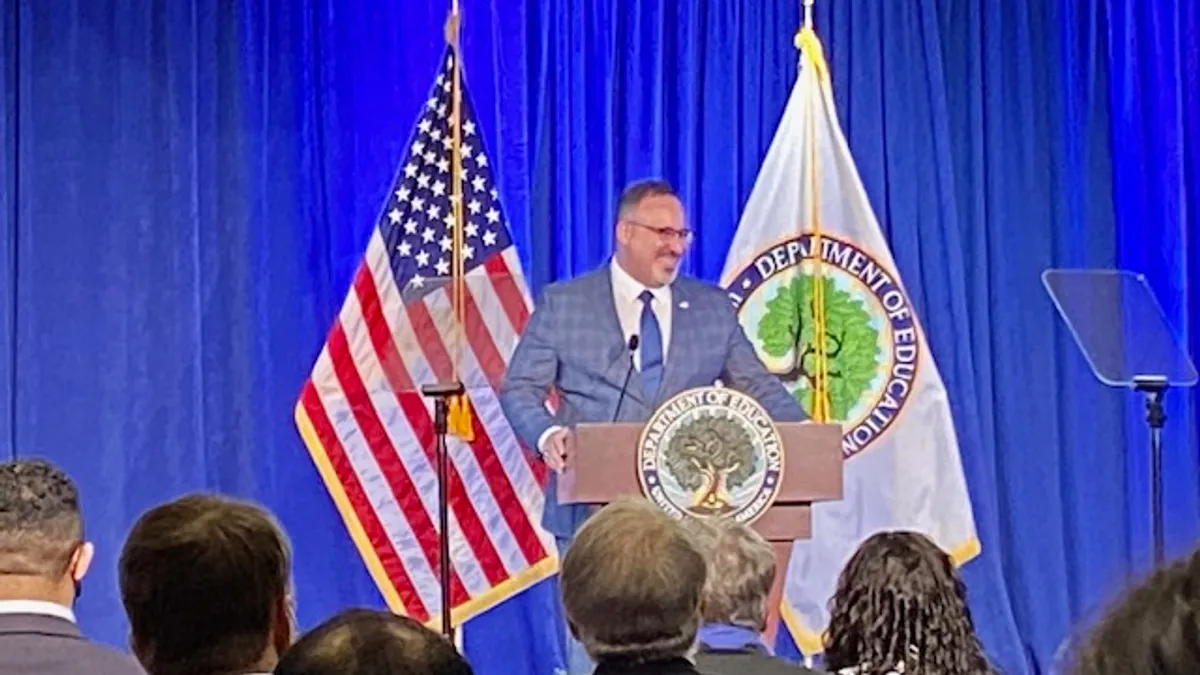Dive Brief:
- Education stakeholders should take the opportunity now to "reset" practices and policies so school systems don't backtrack to inequitable pre-pandemic systems, said U.S. Education Secretary Miguel Cardona during a speech Thursday at the U.S. Department of Education's headquarters.
- Although the U.S. education system, from early childhood learning through college, is in a better place now than two years ago when the COVID-19 pandemic emerged, with nearly all K-12 schools open for full-time, in-person learning, now is the moment to "make education the great equalizer," he said.
- Cardona specifically encouraged unraveling barriers to high-quality education for several underserved student populations, including Black students, students from low-income backgrounds, students with disabilities and English learners. His speech hinted at potential proposals to increase federal funding for Title I and the Individuals with Disabilities Education Act.
Dive Insight:
Although the speech mainly drummed up momentum to urgently increase learning and mental health supports for students, Cardona acknowledged the strain teachers and administrators are under.
"While we must stay cognizant and supportive of the challenges our heroic educators face daily to keep our schools open today, we must also simultaneously meet this moment in our country’s history," Cardona said.
Cardona said keeping schools open to in-person learning alone is insufficient, as the country's schools should "make up for lost time" and be elevated to lead the world.
Although the speech did not offer any new initiatives and Cardona did not take any questions from the live audience — which included education advocates, department staff and press — he did point out specific approaches and programs he promotes, including:
-
Programming that targets learning and engagement strategies such as tutoring, after-school and summer sessions. A goal should be providing tutoring 30 minutes per day, three times a week to each student who fell behind during the pandemic.
-
Encouraging every high school student to participate in at least one extracurricular activity in their school.
-
Supporting mental health well-being in schools' day-to-day schedules and operations.
-
Using American Rescue Plan pandemic-relief funds to ensure every student can read by 3rd grade.
-
Having meaningful and authentic parent and family engagement.
-
Creating stronger college and career pathways among pre-K-12 systems, two- and four-year colleges, and workforce partners.
"This is our moment to lift our students, our education system and our country to a level never seen before," Cardona said.
Daniel Domenech, executive director of AASA, The School Superintendents Association, said in a statement he agrees with Cardona's plea to reset education. "Relying on best practices of the past cannot and should not be an option for educators if we’re going to effectively address the needs of all children, no matter their zip codes or socio-economic status," Domenech said.
The push to keep schools open for in-person learning and to support students' mental well-being aligns with the priorities of Chiefs for Change, a district and state education leaders organization, said CEO Mike Magee in a text. Doing so, however, will require continued federal investments in COVID-19 safety and infrastructure, Magee said.
Overall, Magee said he was pleased Cardona encouraged robust tutoring and inclusive and affordable pathways to colleges and careers.
Ronn Nozoe, CEO of the National Association of Secondary School Principals, said in a statement school and student leaders support the core of Cardona's vision, but immediate action is needed to address school staffing shortages and concerns about teacher and student wellness.
A NASSP survey in December found low job satisfaction among middle and high school principals, with four out of 10 principals expecting to leave the profession in the next three years.
To provide the support school communities need and deserve requires "significantly more funding to strengthen the principal pipeline, attract and retain more staff, and properly carry out lifesaving health protocols that keep students in classrooms," Nozoe said.















